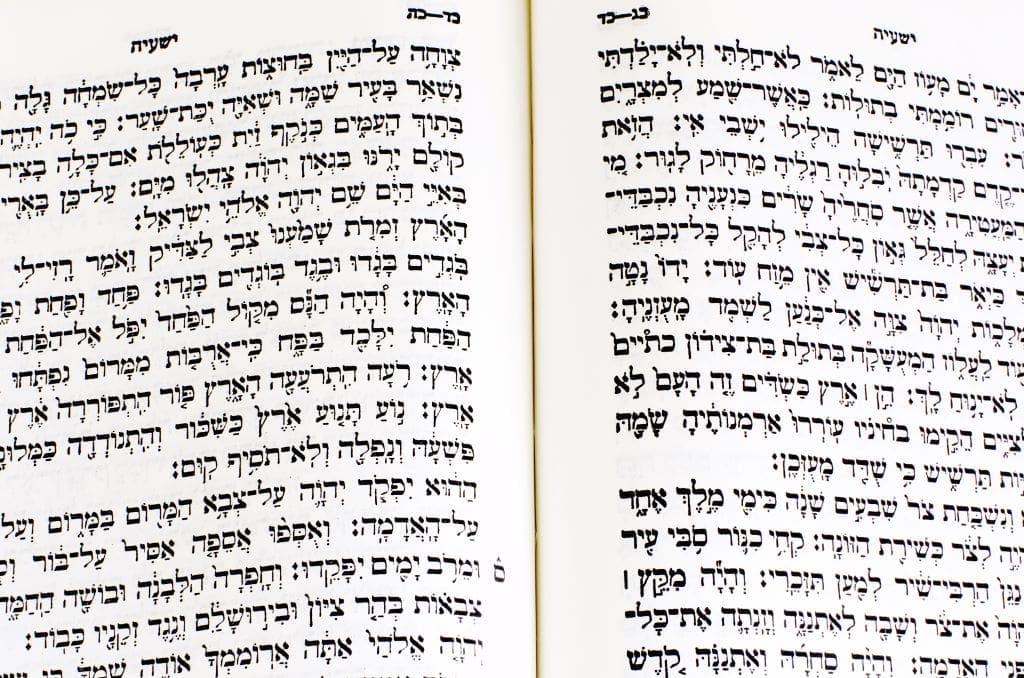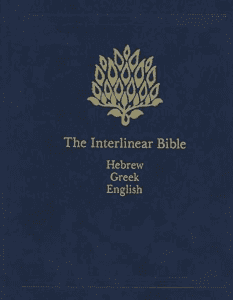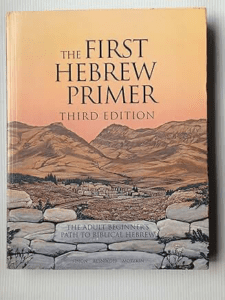
How to Learn Hebrew if You’re Busy
Learning the Hebrew language will be a significant benefit when you incorporate your Hebrew roots into your Christian faith, and here are the reasons I say that. The list of advantages of learning Hebrew is endless!
Most of us lead healthy and full lives, making it challenging to add learning a new language to our schedules. Hebrew is very different from English, and it can be intimidating to tackle because of that. For starters, the letters are different! It’s also a language with sounds we don’t even make when speaking English!

But English speakers can and do learn Hebrew, even if we have little time to spare. I have been increasing my knowledge of Hebrew over the last ten years while also managing a large family, raising little ones, and homeschooling. It’s tough, but it can be done, and here are a few things I’ve used that may help you.
Biblical Hebrew or Modern Hebrew?
When seeking to learn Hebrew, you’ll find two basic categories – Biblical and Modern Hebrew. Biblical focuses on the words and language used in the Bible, and Modern is the language spoken in Israel today. While both have significant benefits, deciding which of these to concentrate on will accelerate you toward your goals. Biblical Hebrew will aid in Bible study, which is the goal of most Christians when they set out to learn Hebrew. Focus on Biblical or Modern and target your studies in whichever area you choose.
Take Small Bites
Even when you’re very busy, you have a few minutes here and there in your day. Just like many things, daily discipline will lead to new habits. Studying even a small amount of Hebrew daily will keep it at the forefront of your mind and significantly increase your chances of remembering what you learn.
Make daily goals for yourself. For example, make a goal to practice your Hebrew flashcards daily or do one lesson from your Hebrew book daily. Discipline yourself to keep up with your goal in the same way you keep up with your Bible study or even your laundry. You’ll be impressed with the results over time!
Prioritize
Also, like other things in life, you’ll get out of it what you put into it. There are (and should be) many more important things in your day than learning Hebrew, but if it has no place in your life, you won’t progress in your understanding of it. Put studying Hebrew on your to-do list or plan it into your daily routine.
Many people say they don’t have time for things they want to do in life but spend plenty of time playing video games, watching TV, or browsing social media. These things aren’t negative in and of themselves, but they do tend to be time-suckers, activities that can absorb hours and take available time away from the more important and beneficial things in life. Make yourself study Hebrew for a certain amount of time or get a specific amount done before entertainment or social media, and you’ll find it easier to accomplish your Hebrew learning goals!
Use Apps
Since we all have our phones on us almost always, it’s convenient to use an app for at least the basics of the Hebrew language. Here are a few I’ve used. Most are free or of little cost.
- Biblical Hebrew Vocabulary (Biblical Hebrew) – This free app covers the most commonly used words in the Old Testament. It’s simple and easy to use. It’s like having digital flashcards; you can even put the cards you need to review back in the “pile.”
- Daily Dose of Hebrew (Biblical) – Here’s another free app with outstanding video lessons progressing from the very beginner level of Hebrew and advancing quickly, yet logically.
- Rosetta Stone (Modern) – Access to this app comes with a paid online subscription. It uses the immersion method of teaching language and is very user-friendly.
- Duolingo (Modern) – Another app using the immersion method is free and includes badges and rewards, which work well for motivating older children.
- Drops (Modern) – This is a fun and free app with short (5-minute) daily lessons that cover essential Hebrew words.
- Nemo Hebrew (Modern) – This free app teaches commonly used Hebrew words and phrases. The student chooses daily goals, and the app has reminders to help reach those goals.
Take a Course Online
I’ve learned so much and enjoyed taking courses through the Israel Institute. They offer classes in Biblical languages (Hebrew, Greek, and Aramaic) and Biblical studies through the Hebrew University of Jerusalem with degree and non-degree options. Their courses meet weekly online and have homework throughout the week. This class is more of a time commitment than other options, but it’s SO worth it! If you are busy, you must manage your time well to ensure you keep up. I do some homework daily to stay current on the lessons, even in my busy life.
There are also some excellent self-paced Biblical Hebrew courses available online from BibleInteract. They have Beginner, Intermediate, and Advanced levels, as well as many other courses such as Koine Greek and Hebraic Methods of Bible Study.
Attend a Synagogue
Each Messianic Synagogue I’ve been to has quite a bit of Hebrew speaking during the service and otherwise. Much of what you’ll hear there is repeated each week, so you’ll not only hear it spoken but also start to familiarize yourself with the words and their meanings, even if you don’t purposely set aside the time to do so. You almost can’t avoid learning some Hebrew if you hang around Messianic synagogues long enough!
Practice Reading the Bible in Hebrew
A great way to do this is with an interlinear translation. I have this one, which has a Hebrew Old Testament and a Greek New Testament. It’s a handy tool for both study and practice.
I recommend the Blue Letter Bible app for a more portable option, a resource I use almost daily. Having it on my phone makes it easy to quickly look up Hebrew and Greek words and read along with the Hebrew and Greek. After downloading the app, choose the “Manage Bible” option and pair the Hebrew Old Testament/Greek New Testament (WLC/WH) with your favorite English translation. Click on a verse or word for more study options.

Teach Someone Else
When I first learned Hebrew, I taught my older children what I was learning. As my level of Hebrew surpassed theirs, I continued to help them as they learned levels below mine. Teaching as I learned helped the basics to solidify in my mind, even as the material was quite primary. Teaching others also encourages me to keep up with my Hebrew. As they do their daily lessons, I am both reminded and inspired to keep up on my own.
Listen to Hebrew Speakers
While learning to read, write, and speak is essential to learning a new language, hearing it spoken is also necessary. You can read about pronouncing a word or forming a specific sound, but there’s no substitute for hearing a native Hebrew speaker speak.
Rosetta Stone incorporates this into their curriculum, but there are other ways to hear it. Search YouTube for people speaking in Hebrew or find a movie in Hebrew to watch. My children watch children’s shows, nursery rhymes, etc., in Hebrew, which helps us all in our studies!
Pray About It
Like everything in your life, especially if you’re learning Hebrew to aid your Bible study, bring it to God. Ask Him to show you where to make time for your Hebrew studies and what methods are available. Ask for the wisdom to retain and apply your knowledge to His glory.
Although it can seem daunting at first glance, learning the Hebrew language is achievable, even in our full and busy lives. It takes discipline and focus in the long term, but the rewards are great! Here’s the link to my Hebrew resources page for more. Get started today!
Here is a book I’ve used to study Biblical Hebrew. I like it because it starts at the very beginning level but has a logical progression through the steps necessary to achieve understanding quickly.
Comments (5)
Leave a Reply Cancel reply
Search
Recent Comments
- Denise Kerhlikar on Explaining The Chosen: Season 3, Episode 3: Physician Heal Yourself
- DSS on Wild Olive Branches: The Blessing of Being Grafted In
- Nicolai Marvin on An Introduction to the Hebrew Vowels
- Kathy on How to Find a Hebraic Congregation
- Amy on Explaining The Chosen: Season 1, Episode 3: Jesus Loves the Little Children








שלום
I used to learn Biblical Hebrew, but now I have a little time for it… I want to continue …Good tips:)
Toda Raba:)
Great tips! I had to sign up for online classes at ulpanor.com because I couldn’t grasp it by myself. language really isn’t my strong suit
I’m sorry your comment wasn’t approved at first. I don’t see why it wasn’t (maybe because there’s a website in it?) but thank you for commenting! I find it very difficult to learn another language but have made progress learning Hebrew over the last 8 years so keep up the good work. I think Ulpanor is a great resource. Shalom!
Excellent! English is my second language! I’m a Christian and follow Biblical Holy Day! The Feast of the Lord! I’m interested to learn Hebrew Language!
Shalom Aleichem
Shalom, Mele!
So glad to hear the Feasts are a part of your faith. I think Hebrew will be beneficial to you. It’s such a rich language, so deep and so interesting!